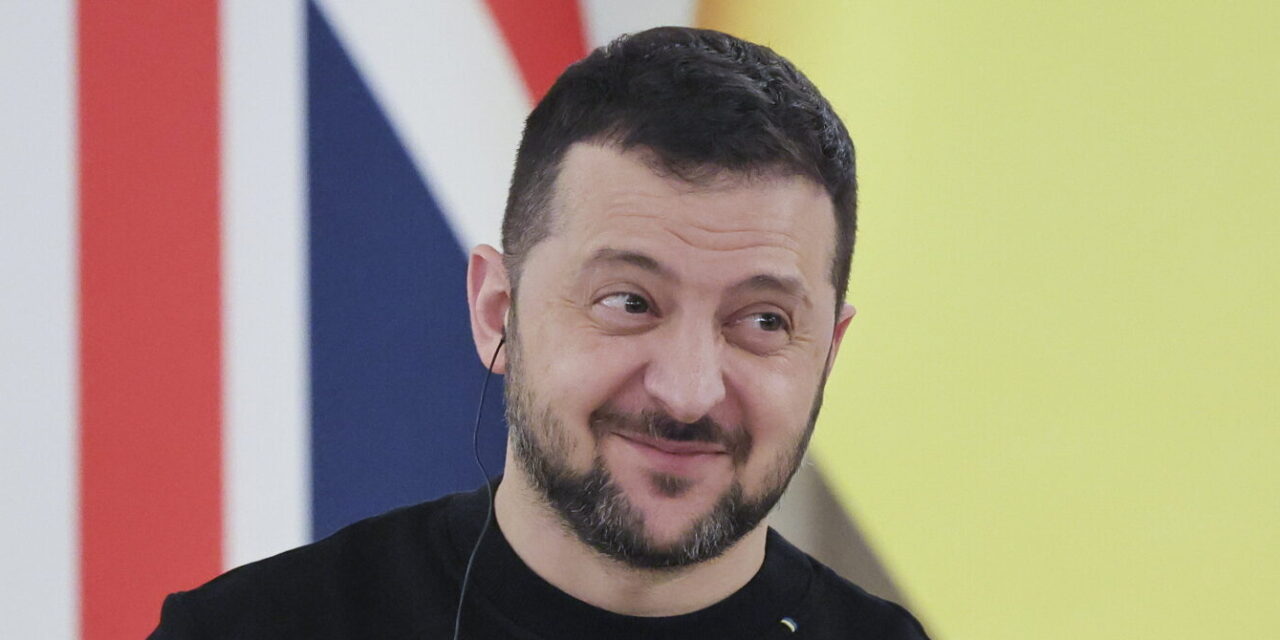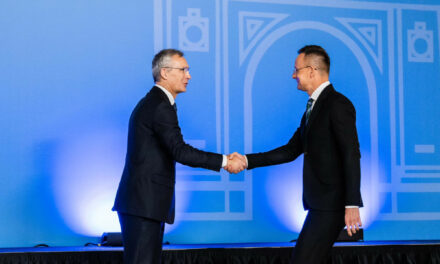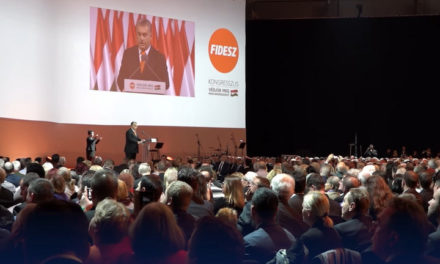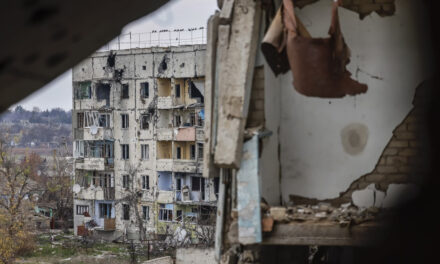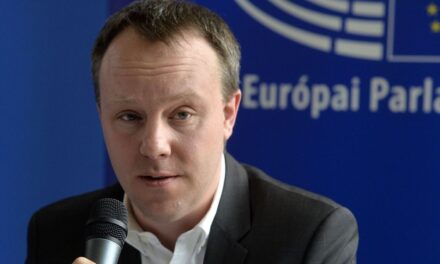While a Potyomkin village is being organized for the foreign press, in the Ukrainian national press, not a shred of classical journalism can be found.
Those who can still kick the ball can only do so because – in exchange for protection – they must also publish articles that please the authorities. The publications that move freely on the field mostly operate with EU and Soros money, in other words: the bloodthirsty Ukrainian war propaganda is based on the money of European taxpayers.
"This website was created with the financial support of the European Union and is being updated. The Media Center of Ukraine is responsible for all published material, which does not necessarily correspond to the point of view of the European Union"
- this is the text on the page of the Ukrainian internet portal, which, according to its own admission, was created at the outbreak of the war in order to help the work of foreign press agencies and crews in Ukraine. They have offices in four locations in the war-torn country: Kyiv, Odessa, Kharkiv and Lemberg.
They help the lost and bewildered foreign journalist prepare accreditation, find contact with the government, participate in the press conferences of government members and various experts, and organize press tours to the areas recaptured from the Russians for crews who request it. Furthermore, their production office even lends a hand in finding interesting themes and heroes. This is all well and good, at least for a lazy foreign journalist who doesn't know the field, who can drink vodka in Kyiv's Hrestyátik while someone else does the background work, which is the pain of the profession.
It is part of the whole picture that the group called the Ukraine Media Center reveals itself right from the moment of its introduction, that it will offer professionalism or cheap propaganda to the Western journalist who goes astray. Therefore, as required by the current Ukrainian reality, the name of the Russian Federation is deliberately written in lowercase letters.
In addition to these, of course, they also give additional advice to the correspondents wandering into the Eastern European country on what is allowed and what is not. For example, they tell you how to correctly describe and pronounce the names of the settlements in Ukrainian - omitting their original Russian names. According to this, not Kyiv but Kyiv, not Kharkiv but Kharkiv, not Dnieper but Dnipro, and not Donbas but Donbas, and finally Odessa can only be Odesa. It is also considered important to share what can be made public and what is classified as a military secret. We can also find out who they help make news channels for, but the range is wide, e.g.: Radio Free Europe, SVT (Sweden), CBS News (Canada), Al Jazeera (English), Zeit Online (Germany), Latvijas Radio (Latvia), Avvenire (Italy), Belsat TV, CGTN (China)
The question arises: who is actually informing the foreigners now?
Ukrainian propaganda press financed from Kiev and abroad
Many Ukrainians have the feeling that even before the war, the leadership in Kyiv had a plan for how it would bring the entire Ukrainian media palette under its control in the event of a possible Russian attack.
And it was, since at the outbreak of the war, the unified television program stream (TELEMARATON) was introduced almost immediately, which means that the leading television stations produce a joint broadcast, which expresses the unity of the nation even in times of war. Even in his name, this marathon program is also picked up and broadcast by small rural television stations, and Zelensky's Presidential Office is known to be responsible for the content.
Against a robust machine, there is hardly any chance for anyone to have a different opinion. There is only room on the screens for war propaganda, victory and the glorious future that follows. The president's advisers, military leaders and spokesmen, pro-war opinion leaders, and those former opposition figures who, appearing in military uniform, are known to be happy to change their opinion, are connected every day, as long as they are properly paid.
Those who dare to kick the ball freely are currently the so-called "Soros players", i.e. Soros accounts.
This is the name given to journalists who, despite the state of war and the two-year-long military mobilization, cheerfully post on the Internet, move freely in the country, organize conferences and even travel abroad.
Male columnists working for media organizations with such affiliations, who are otherwise of conscription age, are not in danger of being called up, they can enjoy privileges if they scold the Russians, Slovaks, Hungarians, Putin, Trump, Tucker Carlson, Viktor Orbán, Robert Fico, Pope Francis, and everyone else who has reservations about the leadership in Kiev controlled from overseas.
For example, Ukrainszka Pravda and one of its sections, Yevropejszka Pravda, used to publish the wildest national, often anti-Hungarian articles. Their journalists also have countless privileges, they are inviolable, they can travel, in return, when they publish an article on social media, they also write the name of the hated country and foreign politician in lowercase letters in the comments. After all, you have to keep up and not fall behind others...
It's not your mouth, it's the summoner!
However, Ukrainian journalists who do not have a military exemption (also) complain that they cannot do their work fairly, because if someone is a little more critical, they immediately receive a military call-up order. Moreover, they do not have any legal protection. There are those who persist, hide and write from home, and there are those who choose the public, just to protect themselves from the authoritarian system.
Such is the investigative journalist Yuri Nikilov, who has caused many scandals with his writings. He criticized the Ukrainian Ministry of Defense for overbilled purchases, but also criticized Zelenskyi for the disenfranchising mobilization bill.
Unknown people then knocked on the door of Nikilov's apartment, shouting that the journalist was deliberately avoiding mobilization. And the entrance was plastered with threatening messages. They also made a video about it. According to the journalist, the air around the profession is getting thinner and thinner.
Others decide to go abroad temporarily, because the Zelenskiys have a file on everyone, or, as it was called in the Soviet Union: kompromat. Diana Panchenko, a pro-peace television host, made the same decision last year. In one of his videos, Panchenko called on his colleagues working in Ukraine to temporarily leave the country if they want to work freely. As he put it:
Zelensky wanted to destroy me with criminal proceedings and sanctions. But I'm fine. Now they want to intimidate you based on my example, so that you don't deviate even an inch from your party's position, so that you don't dare to criticize. Just share Zelensky's videos. You lived in fear, because you know very well how weapons and humanitarian supplies are stolen, and that the losses on the front are huge. They won't even let you in there, so you don't see what you shouldn't. You know everything, you just have to listen. I advise you: leave Ukraine if you want to keep your profession. I have never felt so free as now after leaving Ukraine.
In Ukraine, the role of the classic press is slowly being taken over by Telegram channels. Although there have been attempts to do so, the state has not been able to limit them. So people's eyes are starting to open, and fewer and fewer people are tuning in to the state propaganda station, instead they are getting information from it. The reality also appears here: amateur footage of the horrible war, the cruel mobilization, the piles of corpses, the hungry and exhausted soldiers suffering from a lack of supplies, the bureaucrats participating in the theft of Western humanitarian aid, and the list goes on.
Unfortunately, it is endless.
Hungarian Nation
Featured image: Ukrainian President Volodymyr Zelenskyy with British Prime Minister Rishi Sunak at a press conference at the Presidential Palace in Kyiv on January 12, 2024. MTI/EPA/Oleh Petraszjuk

